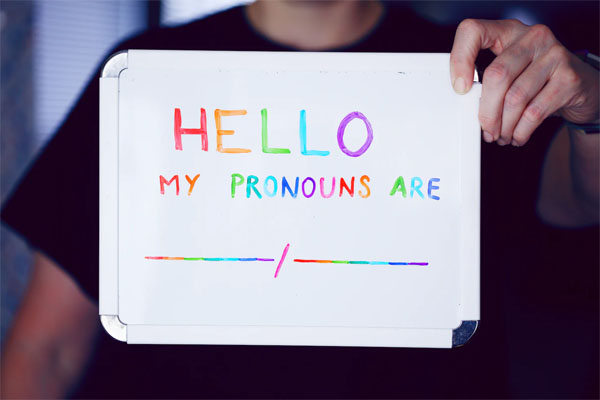Today on 19 October, we celebrate International Pronouns Day. The day aims to make respecting, sharing and educating about personal pronouns commonplace. It’s also key to LGBTQ+ allyship.
International Pronouns Day happens each year on the third Wednesday of October. Referring to people by the pronouns they determine for themselves is basic to human dignity. Being referred to by the wrong pronouns particularly affects transgender and gender nonconforming people. Using the right pronouns are key to celebrating people’s multiple, intersecting identities.
It is becoming more common for professionals to display their pronouns online and at work, and you don’t have to be LGBTQ+ to do so. International Pronouns Day began in 2018 and takes place on the 3rd Wednesday of October each year, encouraging colleges, schools, workplaces, and local organisations to hold educational and empowering events about personal pronouns and share them.
WHY PRONOUNS MATTER
Often pronouns automatically imply a gender, such as “he” to refer to a man/boy or “she” to refer to a woman/girl because people make assumptions about the gender of another person based on the someone’s appearance or name.
These assumptions, however, aren’t always correct, and imply that people have to look a certain way to identify with a specific gender. Additionally, being referred to by the wrong pronouns particularly affects transgender, non-binary and gender nonconforming people negatively.
Using correct pronouns is key to being an LGBTQ+ ally. Taking the time for the sharing of pronouns in person and online is a great way to show support for others who do not have the privilege of assumption.
HOW TO SHARE PRONOUNS
A great way to create and normalise space for people to share their pronouns is first to share your own. If you are unsure which pronoun a person prefers, you can start with your own. For example, “Hi, I’m Dana and I use the pronouns she/her. What about you?”
If you are attending an event, you can write your pronouns on your nametag. Or you can add your pronouns to your display name on apps and software where it’s already available, like Zoom.
ACTIVITIES TO PROMOTE PRONOUNS
Here are some other activities to help create more awareness around pronouns in your organisation:
- Post your own pronouns on social media.
- Hold an event where sharing pronouns during introductions is normalised. This could be as small as just making sure pronouns are a topic during a staff or team meeting on that day.
- Have name tags that include a place for pronouns.
- Run a workshop on how to share and ask about pronouns, and how to recover from mistakes. Consider bringing in an expert. Consider watching videos about trans issues and pronouns if you aren’t prepared to run a whole workshop.
- Run a workshop on the ways gender/pronouns show up in a variety of languages, and how trans/nonbinary folks are making progress in a variety of linguistic practices.
- Create a poster campaign on your campus or at your workplace, with educational messages.
- Think about having many different distribution points for materials (e.g. buttons, stickers, informational cards).
- Encourage your campus or organization to make pronouns an optional field in student/personnel records.
- Put your pronouns on your business cards and email signatures, and encourage others to do the same by making it easy for them, such as making it a drop-down/fill-in option when requesting business cards, for example.
- Put your pronouns on name badges (e.g. temporary ones for events/conferences, and permanent name badges used for work).
- Ask for resources to make materials and activities that educate about pronouns something ongoing, not just for International Pronouns Day.
- Organise best practices for trans inclusion on your campus or at your workplace.
GUIDE TO PRONOUNS
Check out the video guide on what pronouns are, why they matter, and how to use new ones and support your trans friends below.
For more information about pronouns check out Pronouns.org.
RELATED ARTICLES
One in five workplaces do not have any policies in place to support their LGBTQ+ staff at work. Click here to continue reading.







































